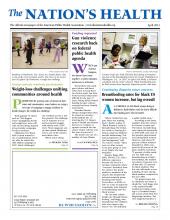Americans getting the least amount of sleep consume fewer calories but may still be overweight, a recent study revealed.
A higher body mass index despite less sleep and fewer calories is one of many results that surprised authors of a study comparing sleep and dietary habits published online in Appetite in January.
The study was important because diet is generally left out of the conversation about studies linking obesity and sleep, said lead study author Michael Grandner, PhD, a research associate at the Center for Sleep and Circadian Neurobiology at the University of Pennsylvania’s Perelman School of Medicine.
“Part of the reason is because it’s tough to study,” Grandner told The Nation’s Health. “There really hasn’t been before an opportunity at the population level to look at associations between dietary patterns and sleep patterns.”
Participants in a 2007-2008 National Health and Nutritional Examination Survey were asked what food and drink they consumed in one day. The information was compared with four sleep patterns. Patterns ranged from “very short,” which was fewer than five hours of sleep, to “long,” which was nine or more hours each night.
People sleeping fewer than five hours consumed less water and less lycopene, a vitamin found in foods such as tomatoes that can protect against heart disease, the study said. They were also more likely to be on a low-sodium diet or consume more or less food than they normally do, the study said.
People who slept nine hours or more also ate fewer calories but tended to drink more alcohol, the study said. Grandner said this surprised him because alcohol consumption is usually linked to “shorter, more disturbed sleep.”
People who got the “standard” seven to eight hours of sleep had a more diverse diet of nutrients, minerals and vitamins such as lycopene and vitamin C, the study said.
As the study contradicts past research that said people with less sleep consumed more calories, the relationship between how long people sleep and their energy balance still needs to be explored, Grandner said.
The next step should be an intervention study to change dietary and sleeping patterns, Grandner said. He said the takeaway from the study for the public health community is that sleep is a critical factor for health and, like diet, it cuts across all physiological processes.
“Also it’s similar to diet that too much isn’t good for you and too little isn’t good for you,” Grandner said. “It differs from person to person. There are a lot of people not experiencing good sleep. I would urge the public health community to think about sleep and think about how they’re assessing sleep in their studies.”
For more information, visit http://www.sciencedirect.com/science/article/pii/S019566631300024X.
- Copyright The Nation’s Health, American Public Health Association









